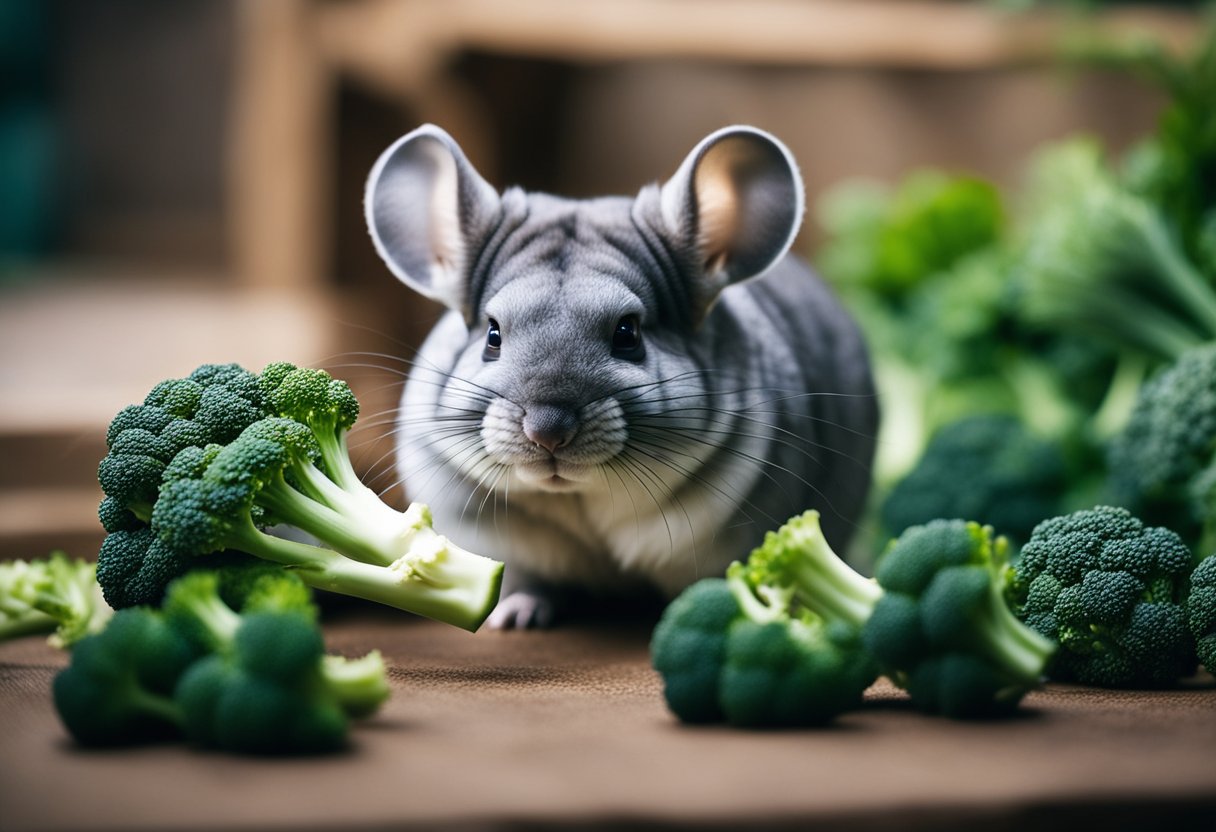Can Chinchillas Eat Broccoli? Understanding Their Dietary Needs
Chinchillas are adorable pets that require a special diet to stay healthy. When considering what to feed your chinchilla, you may wonder about the safety of various vegetables. Chinchillas can eat broccoli, but only in small amounts as an occasional treat.

While broccoli offers some vitamins and minerals, it should not make up a large part of your chinchilla’s diet. It’s essential to ensure that their main food sources are hay and pellets, which provide the necessary nutrients for their health. Monitoring your pet while introducing new foods will help you avoid any digestive issues.
Key Takeaways
- Broccoli can be a treat for chinchillas in moderation.
- Focus on a diet rich in hay and pellets for optimal health.
- Always observe your chinchilla for any reactions to new foods.
Nutritional Profile of Broccoli for Chinchillas

Broccoli can provide some vitamins and minerals for chinchillas. However, it’s essential to consider both the nutritional benefits and the potential risks associated with this vegetable.
Vitamin Content and Benefits
Broccoli is high in certain vitamins that can benefit your chinchilla. It contains:
- Vitamin C: This vitamin supports your chinchilla’s immune system and helps promote healthy skin.
- Vitamin K: Important for blood clotting and bone health.
- Folate: Essential for cell division and overall growth.
While broccoli offers these benefits, remember that it should only be a small part of your chinchilla’s diet. Chinchillas primarily require hay and specially formulated pellets. Too much broccoli can lead to digestive issues despite its vitamin content.
Potential Risks and Toxins
Despite its benefits, broccoli can pose risks for chinchillas. It contains a high water content, which can upset their sensitive digestive systems. Here are some key concerns:
- Gas Formation: Broccoli can cause gas, leading to discomfort or bloating.
- Digestive Problems: Introducing it too quickly can result in diarrhea. Always introduce new foods gradually.
- Caloric Balance: While broccoli is low in calories and can be an occasional treat, it lacks the necessary protein and fat that chinchillas need in their diet.
Due to these factors, it is crucial to feed broccoli in moderation and watch for any negative reactions.
Feeding Broccoli to Chinchillas

When feeding your chinchilla broccoli, it’s essential to consider proper portion sizes and how often to offer this vegetable. Understanding these aspects can help you maintain your pet’s health and well-being while still providing some variety in their diet.
Proper Portion Sizes
Broccoli should be treated as an occasional treat rather than a staple of your chinchilla’s diet. A small portion goes a long way.
- Recommended Amount: Only give about 1-2 small florets per feeding.
- Size Matters: Cut the florets into smaller pieces to make it easier for your chinchilla to eat.
Too much broccoli can lead to digestive issues due to its high fiber content. Monitor your chinchilla for any signs of distress, such as bloating or diarrhea, after introducing broccoli.
Frequency of Feeding
You should not feed broccoli to your chinchilla every day. Instead, limit broccoli to once a week to ensure a balanced diet.
- Weekly Treat: Offer broccoli only once a week.
- Balance with Hay: The majority of your chinchilla’s diet should consist of hay and pellets.
By using a consistent feeding schedule, you can prevent any digestive upsets while ensuring your chinchilla enjoys the occasional crunchy treat.
Resources
Understanding more about feeding broccoli to chinchillas can help you be a better pet owner. Here are some helpful resources:
- For detailed information on vegetable safety, refer to “What Vegetables Can Chinchillas Eat?”.
- For insights on the overall diet, check out “What To Feed A Chinchilla (And What To Never Feed)”.
These resources will give you further insights into maintaining your chinchilla’s health while making informed feeding choices.
Frequently Asked Questions

You may have some questions about what foods are safe and healthy for your chinchilla. The following information will help clarify what vegetables they can eat, what to avoid, and tips for a balanced diet.
What vegetables are considered safe for chinchillas to consume?
Chinchillas can enjoy a few safe vegetables in small amounts. Some options include parsley and broccoli, but these should only be treats, not staples in their diet. Always introduce any new vegetable gradually.
Which foods should be strictly avoided in a chinchilla’s diet?
Certain foods must be avoided for the health of your chinchilla. These include chocolate, caffeine, and high-sugar items. Fruits like bananas and citrus are also not recommended because they can upset their stomachs.
What is the ideal diet for a healthy chinchilla?
A healthy diet for your chinchilla mainly consists of high-quality hay and pellets. These provide the fiber necessary for their digestion and overall health. You can also add chinchilla-safe treats in moderation.
Can chinchillas have fruits like apples in their meals?
Fruits like apples can be offered but only in tiny pieces and very sparingly. Chinchillas’ digestive systems are not designed for high-sugar foods, so limit the frequency of fruit treats.
How does the consumption of lettuce affect chinchillas?
Lettuce is not recommended for chinchillas. It has a high water content and can lead to digestive problems. Stick with safe vegetables like parsley instead.
What are some common feeding mistakes made by chinchilla owners?
Many chinchilla owners make the mistake of feeding too many treats or not providing enough hay. Overfeeding fruits or vegetables can also lead to digestive issues. Always prioritize a balanced diet.

